Photo
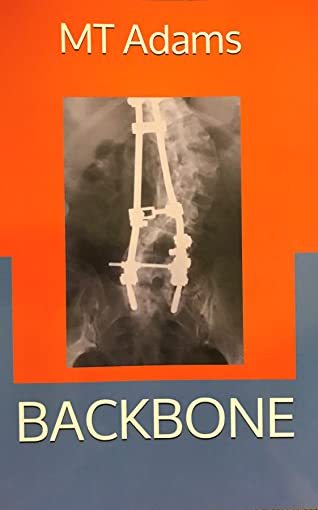
Backbone by MT Adams
What an incredible telling of unending pain, the tenacity to endure it and the ineptitude that caused it. Horrible backstory to the medical cliques that ignore their Hippocratic oaths to ensure prestige, no matter how unearned. (Do not read this book outdoors where bugs can easily fly into your mouth with the constant dropping of your jaw.) The dereliction of duty is truly appalling. The lack of empathy or simple compassion is unnerving. Doctors? Only to their own advantage. But not all put themselves before their patients. Mary was blessed with a handful that listened, heeded, and helped. But during it all: decades of constant pain, repeat surgeries, denials, misdiagnosis, disregard, she lumbers on. Had her scoliosis been tended to when first diagnosed at age 10, instead of pooh-poohed until her mid-twenties, there could have been an entirely different story told.
I won’t go into detail as to the events of her suffering. You need to feel them full force as she relates them. But there are good moments: the birth of her son, the friends that reach out to help, the doctors who truly care. There is a quirky sense of humor to enjoy and the comfort that if she wrote this book, she survived.
I gained quite a bit of medical knowledge via her own research and the recalling of doctor visits. I also gained a big mistrust in the medical field.
It’s a fast pace read that culminates on a joyous day. (You do have that to look forward to. ) Brace yourself, literally, for a spine-tingling read that will always have you asking for a second opinion...without mention of the first.
2 notes
·
View notes
Photo

Brother Cobweb by Alfred Eaker /Illustrated by Todd M. Come
Opening with the ranting of a pentecostal preacher into the mind of seven-year old Calvin Elkan, who in lieu of attention, creates art in a drawing pad as his derrière numbs atop a hard pew. A caricature of near monster features, Brother Cobweb is born, a minister of pseudo-satanic lunacy.
Growing up in a blue collar home with a younger, innocent brother, his over-worked, typical father, religiously crazed mother, and beacon of sanity and hilarity great-grandfather, Calvin is juxtaposed to creativity and suppression as the mother battles for his sinking soul against anything not in praise of God. Might I add that those battles were truly such. Abusive, spiteful and manipulative, mother Nancy was “Carrie’s” mother to the nth degree.
Needless to say, great-grandfather “Pop” (an atheistic Jew) is the comic relief in this drama. Calvin, still grappling with what to believe, is steadily leaning alee from the absurd. The ensuing disgust of his my-way-only mother is simmering like the fires of Hades. Bonding through music and creative imagination, Pop and Calvin sequester solitude in a bedroom off limits to the tyrannical mother.
When Pop passes, there is no safe place for Calvin. The abuse intensifies, as even his passive father defers to Nancy’s rages. But there is music. Sweet movements to quell. Savage beasts be damned!
Making it to art school, with scholarships, Calvin is instructed to study the predecessors of his preferred era. Professor Hillcrest nurtures. Calvin learns and flourishes. After a final attack from his mother, he moves out, barely surviving on meager wages. Life feels hopeless, he succumbs to despair.
Finally finding his niche with a group of artistic friends, Calvin gets into a gallery and begins a new phase of life. There is a woman whom he begins to hang out with and eventually relents to marrying her out of her bad home life. But it’s not for him. She is not the one.
Always there are men of religious beliefs that filter in, good or bad, to steer him. A life of subjugation renders him easily persuaded, but he does hold fast to his anti stance against any holy rolling, tongues spewing ravers, welcoming the company of two Catholic priests.
Revelations surface, secrets expose themselves, attempts to rectify are extended. Calvin finds his soulmate, his place, and his release. As happy as such a life can be expected, there is a resolved ending. A hip hip hurray with even a resounding amen!
Snips of theological insight, musical and artistic education are an added bonus to an engaging read that should assuredly make you think hard on your own spiritual path. When and if Calvin creates his own church, I hope one comes nearby.
Dark humor at its bleakest. The tragic life of a child reared in an overzealously religious house, his mother, a freak of Pentecostal piety and brutality. Brother Cobweb is an artist’s escape, his split-caricature-personae, starting at victimized age 7 to survival adulthood. Haunting visuals, even without the mastery of illustrator, Todd M. Coe.
0 notes
Photo
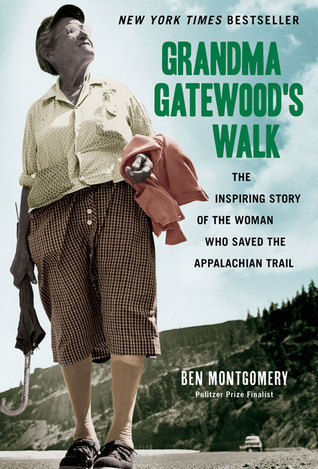
Emma Gatewood decides it’s time to start her bucket list and sets off to hike the Appalachian Trail. Mother of 11, grandmother to 23, and 67 years of age. Telling those left behind she was merely “going for a walk” she implements her years of farming, living off the multiple elements of the land, and basic survival skills, she packs a small sack and begins.
The year was 1955.
This was not your current AP of frequent shelters, food sources, or even fellow hikers. Days alone, sleeping in the wild, battling the elements and wildlife, she was a tenacious reckoning of savvy chutzpah. A small journal was mostly her only source of conversation, albeit one-sided.
Her amazing journey was inspirational in so many ways. A testament to female endurance, acceptance and overcoming pain, thrift and common sense. That she did all this with the bare minimals even further extols her superhuman traits.
The few people she conversed with on the trail, the sights, the perils, the wonder, kept briefly in her journal and shared in snippets in this book. Very much the minimalist, even her thoughts were only as needed.
Once she completes the first trek, the accolades pour in and her celebrity begins. On her second thru-hike, she is often recognized and given better hospitality and occasional “Trail magic” but she mostly shuns the hubris and goes about her way.
Add in the Oregon Trail and a 3rd A.T. hike( albeit sectional, this go) not to mention trails she instrumentally creates in Hocking Hills, Ohio (of which I hope to enjoy soon) and we have one awesome woman who sets the marker for just about anyone.
Backstory of her abuse at the hands of her then husband gives an inkling to where her perseverance originated. A loving, teaching mother, her children also grew up with her knowledge of nature and love if the outdoors.
As much a historical take of the time, creation of the Trail, and anthropological look at the denizens along the way, it’s a fascinating read in just so many ways. The first of so much we take for granted daily: paved roads, TV’s, cell phones, indoor facilities, not that long in our norm. It makes us aware of how pantywaisted we are today.
I hope they make a movie about her soon. If Bill Bryson has one for 1/3, she sure need one for 3 times.
0 notes
Photo

The Trouble with Goats and Sheep by Joanna Cannon
During a particularly span of hot, arid weather, two 10 year old best friends decide they will investigate the disappearance of one of their older neighbors. Grace and Tilly just know there has to be more than “people do strange things in the heat” to Mrs Creasy’s sudden departure.
Using a cover of being Brownies, out to “lend a hand” or to get a specific badge, they go door to door seeking answers and God, who Grace was told is everywhere to keep you safe. If they find God, then they will find Mrs Creasy
The story line skips time frames, which I have always found annoying, giving clues and backstory. It gets a bit confusing.
The small estate, where 6 families live, numbered in a cluster, is a long clique with its own cache of secrets. Some shared, conspiracally, while others in confidence. None with Walter Bishop, the oddball outsider no one cared to know, but all blamed for any and all misfortune or mystery. It is he they target. It is he they punish.
I truly appreciate her writing, the turn of a phrase and invoking metaphor. Quite poetic. And the best “scene” was the two girls in the garden, “earning a badge” with neighbor, Eric Lamb. From this point on, I absolutely love the book. I’m in its rhythm, digging its style, feeling the characters.
Grace and Tilly continue their search for God and Mrs Creasy, finding so much more on their quest. The adults are all a bunch of racist, unforgiving islands that can’t accept anything outside their realm. (Except Mr Lamb)
It’s as much a book on acceptance as it is a mystery. How they blatantly call out their own rawest faults in 3rd person denial while quoting bible verses. Sounds like current affairs, but let’s not go there
Let’s say it’s a story of friendship, written in enviable prose, that may make you look into your own soul and question your last action and plan a better future.
0 notes
Photo
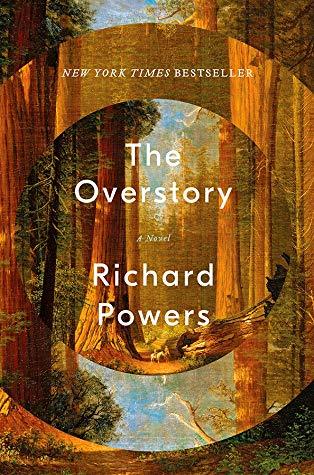
The Overstory by Richard Powers
One of the few surviving Chestnut trees is the center of a 125 year tale of multigenerational farmers, dwindling down to just a homestead, and this tree that anchors them since its planting. Immortalized in monthly photos, tasked from each father to son, it stands testament to survival, documented in its regal simplicity. Stoic when all else fade to memories.
The following tale is of a Chinese student of engineering who comes to America as his father’s last hope, as Mao takes their livelihood (and lives) away. He settles, schools, marries, and begets 3 daughters. He refuses his native tongue (yet for all his years in America, still talks like a newly embarked?) ... primarily set around a mulberry tree, of deep family lore, it is also where it ends.
Adam Appich is a gifted child in a family of mostly irrelevance. His story is sad, for the blindness and disdain. One of 5, he creates his own solitude in nature, observing. Each child had a tree planted for their birth, pertinently assumedly. Was not quite sure if the ending was intended to be humorous or not, but I chose to take it that way.
Douglas Pavlicek proves himself in the service, fighting in Vietnam and gets shot down after the war ends, still attaining a Purple Heart and an Air Force Cross for his injuries. No longer usable, he afters at a horse ranch where he reads Nietzsche to the steeds and tries to talk up the lonely street traffic via purposeful pot holes at the property end.
Quitting that job, he drives westward, happening upon a hidden clearcut while relieving himself roadside. The vastness angers, saddens and awakens him. National forests. Gone. He wants to take action. He hires on to replant designated areas, knowing it’s but a temporary fix, but a fix just the same.
I think that, so far, was the saddest chapter for me.
In Neelay Mehta, it dawns on me the centered eclecticism of this book. To write one story is good, admirable. To write 12 different stories in one book is, well, amazing. They need not all the pages each, as the story told us enough. I am in awe of the diversity, yet connection via a trees insertion. One or a forest, starring or backstage. Just as we all have that rooted factor in our own life - a tree, somewhere, sometime, mattered. Bravo, Powers, bravo.
Patricia Westerford !!!!
As brilliant as brilliant can be. I am in total, blissful awe. I don’t want to read another word, maybe ever. Just live in this story forever.
And then the stories start to connect. Branches grown inward towards the trunk of the whole. I wish I had paid more attention earlier.
I’m too connected, concerned, overpowered by the eco ramifications... it’s too real life (RL) given today’s atmosphere of disregard and gluttony. This book is breaking my heart.
I do not recommend this book for eco-empaths, but for general readership, it’s an in-depth read, fully charged and well executed. Powers delivers a diverse cast of characters that are all united in nature love. I wish I could say the same for all humanity.
0 notes
Photo
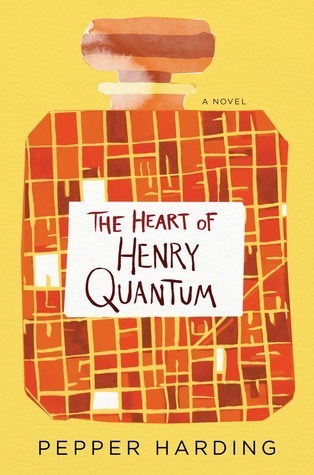
The Heart of Henry Quantum by Pepper Harding
Henry Quantum works in advertising in a nondescript office that looks into an apartment about be a strip joint. It’s December 23rd and he realizes he has yet to buy his wife a gift. Opting to buy her a bottle of Channel 5, he sets it as his goal for the day.
Henry has a mind that wanders more than Grandma Gatewood did and tends to miss a lot of stops along his way.
Reminding me of Ignatius J Reilly, he’s a man of his own mind. Analytical, subjective, goofy, and endearing.
His latest promotional campaign is for “Protox” .. a purported skin enhancer that, in truth, is no more than a laxative for which “The reason your skin glows is that you are totally dehydrated and feverish.”
The revelations he encounters as he tries to tout virtues are hilarious! His fear of becoming a sophist slave to the firm more so. I like Henry. We think so alike. (An ongoing train, dazzled with graffiti, with cars from every whichwhere.)
Henry happens onto Daisy, an affair he had some 5 years ago. She is not so freshly divorced, while he remained wed. He was on his way to get the Channel. She tells him she still desires him. He tells her he loves his wife, Margaret. She flees. He ponders.
The voice of Margaret follows as she heads out for a nooner with her lover. She no longer loves Henry and contemplates life with Peter, as the two unite for the day.
The voice of Daisy makes the next chapter glow. Vibrant, loving, needed. She survives the day, reminiscing and surrendering. She yearns as it rains
Henry has not bought the perfume yet. There are too many distractions, mentally and physically, for him. We follow their leads. We all end up at the same place
Thank you BookReporter for the joy of reading this story.
0 notes
Photo
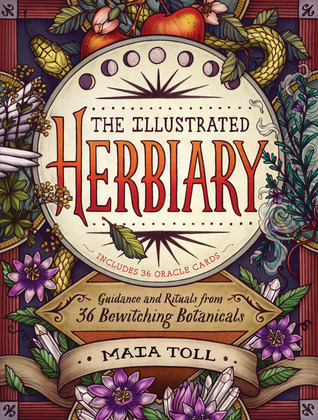
The Illustrated Herbiary: Guidance and Rituals from 36 Bewitching Botanicals by Maia Toll
Maia Toll apprenticed for a year in Ireland, studying the old ways of plant uses while staying with a traditional healer and herbalist, tending the garden, helping to make medicines, and observing the care of clients. Secluded in a “little house set among the Irish cattle fields” away from distractions, she begat the share knowledge of her “scientist, witch, gardener, and detective” as she learned deeply by smelling, tasting, and feel of the herbs being used. An intimate introduction to nature’s medicine cabinet and understanding how traditional healers know, first hand, how their remedies work, via their own self-inducements. How the plants are used “both for healing the body and for salving the spirit.” 36 plants, common & botanically named, are gorgeously illustrated by Kate O’Hara, and given a brief introduction with existential properties, followed by a meditative ritual and then a reflection. This, to me, was the most disappointing part of the book. I, somehow, expected to have actual rituals, as in using the herbs in a tincture or actual healing process. Instead, we get a loose meditation on the herb, itself. I wanted to read of its magical history and properties, ways it had been known to cure and things to avoid, The only thing that came close was on the Hawthorn tree, Yarrow and Oat bathing recipes. But, still, a beautiful book to add to one’s collection.
Hats off to Mz O’Hara. Her art was enthralling, especially her Quaking Aspens.
Included in the book are 36 oracle cards of the wonderful illustrations within, along with a “how to” section on their usage.
0 notes
Photo
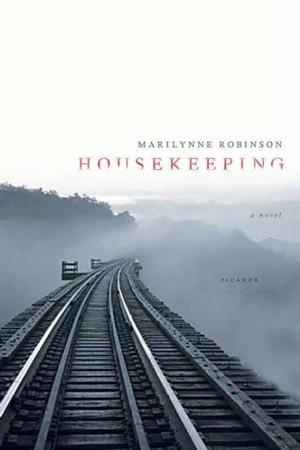
Housekeeping by Marilynne Robinson
A train wreck on a dark, freezing night as it crosses a high bridge, over a slowly icing lake begins an ancestral tale of life in one house. The family, in stages, that resided there, generation after another.
The focus is on Lucille and Ruthie, two sisters abandoned on their grandmothers porch as their mother drives away to drive off a cliff. When the grandmother dies, her spinster sisters try to care for the girls, but realize they are feeble and inept. They contact the sister of the deceased mother, Sylvie, to come stay with them. It is obvious Sylvie is a vagabond and unable to give up her ingrown ways. There is a mental instability and penchant for dark solitude.
The girls, mostly unto themselves, try to normalize their lives, but secluded, they have no gauge to perception. They begin to drift apart with Lucille eventually walking away to stay with a teacher, accusing Ruthie of being too like Sylvie and unable to change.
The downward spiral into a sad madness of hoarding and neglect eddies Sylvie and Ruthie into a solitude, solicitous to the well-meaning and abiding, until even for them, a hopelessness slides in through the cracks.
As much as this is a story of self contentedness, is that also of despair. Of always searching for an abyss to be lost in, unseen, unheard, unremembered
0 notes
Photo
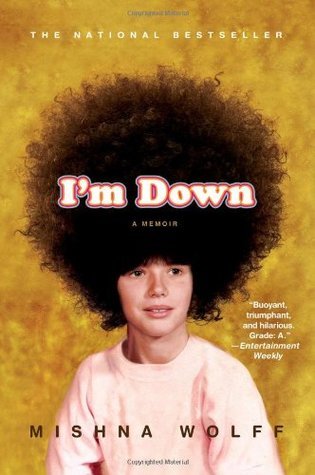
I’m Down by Mishna Wolff
When a white child grows up in a white family with a father who thinks he’s black, acts like he’s black and expects his wife and 2 very young daughters to be just as black as the neighborhood they are growing up in, it can be a bit unnerving. Sure, he fits in, having grown up there and already making his mark, but in the few years away, when the children are born, there is a separation that Mishna, at just 6, can’t quite bring together.
When her parents divorce shortly after, she and her younger sister stay with their father while their mother deals with life as it is. Forced to attend a summer “day camp” while their dad works, Mishna finally finds the voice to “cap” back at the other kids who ridiculed her as soon as she walked through the door. With new found chutzpah, she attains the friendships she desired as well as the confidence to gain a few more.
Finally making her way in school, she is again upheaved when she is sent to a different school for smarter kids. Rich kids. Still trying to please her father, who seems to prefer her dumb & cute, she is tasked with tending to her younger sister, her homework, the extra curriculum he signs her up for, and to adore his new girlfriends, as long as they are.
Wanting a better future, she decides, at 12 years of age, that scholarships are her ticket to the best college, but how? Knowing her father got in via football, she sets her goal for bulking up to play. In the meantime, she joins a swim team and soon excels at the breaststroke. So much so, she is asked to join a real team, but she wants the glory of football, because, after all, “It’s not like you sit down and watch Monday night swimming.”
Home life escalates into animosity over Mishna’s desire to better herself and the needs involved with such. Her father has remarried, his new wife supports them all with the addiction of her own two children and feels Mishna should be contributing more, monetarily and domestically. Arguments erupt, Mishna continues to subjugate herself, hoping to appease, and continues to fail. Realizing she can never be all, she leaves to live with her mother, finding a new peace and outlook on life. Wisdom enters with the realization that even rich kids have messed up lives and she needs to own her own, center herself, to attain any goals she holds.
If you loved The Glass Castle by Jeannette Walls, you will equality enjoy this. Filled with much the same parents, sibling adoration, smack-yourself-in-the-head situations and financial deprivation, it is inspiring to see her win in the end.
0 notes
Photo

Lethal White by Robert Galbraith
Opening on wedding day for Robin and Matthew, a mismatched and doomed couple who are merely going through the paces, fully aware it should not be so. Robin is reeling from being fired from the job she so intensely loved and missing the boss she barely admits should have been her groom. Said boss, Cormoran Strike, has shown up for the event, hoping to ask her back to work, wishing he could ask more. Truce made between them, while a division is further wedged between husband and wife when she finds he had been lying to her about Cormoran’s attempts to contact her.
Oh my. This book was just so engrossing, I forgot to take notes! I’ll just say it’s full of surprises, both good and horrible, plenty of twists and perfect dialogue.
And, bravo Robin!
0 notes
Photo

Lincoln in the Bardo by George Saunders
Gads, am I the only one who did not find this extraordinary? While the historical citations were interesting, I found the conversations nothing but confusing. Maybe it's just my need for concrete writing, but the mortar just fell apart and I had a difficult time figuring out just who was saying what, not matter how it was cited. And the "sick-box poop" ?? (OK, that was kinda funny, but really?)
Just not my kind of enjoyment, tho happy it was a quick read.
0 notes
Photo

Death and Daisies by Amanda Flower
Fiona Knox owns a flower shop in Scotland, she also owns a “charming moorland cottage” that fronts a walled garden in the back. A magic walled garden, that is. Inherited from her godfather, along with the title of “keeper” and the duty to maintain both its magic and its secrets.
Her younger sister, Isla, from their homeland in Nashville, Tennessee, is over for a last fun summer “before adulthood” and is helping run The Climbing Rose.
There is a long lineage around the garden, based on a menhir with an ancient rose climbing up and around it. A promise made and handed down through the centuries, and now tended to by Fiona.
A storm on the very near horizon makes them decide to close up shop and head home to safety. Come the following afternoon, there is a body found. The local minister (and protagonist to Fiona), has washed ashore, but it is soon evident he didn’t drown at sea. Just 2 months into her residency with as many murders closely associated. The roots spread out, popping up several suspects and threats. Going against the requests of her blooming romance partner, Chief Craig, to stay out of his investigation, Fiona finds herself digging where she shouldn’t and nearly ends in her own grave. A most unlikely hero saves her and life goes on. Visions, foxes, time capsules, and revelations all blend in for a cozy stroll.
A bit overwritten at first, but once introductions were made and scenes set, things got more relaxed and fun. There were a couple of snafu’s: The two “steaming plates of chicken Marsala” being brought from the kitchen twice (page 92 and again on 100) and did I miss something? Who was the accomplice?
*See if you can find the Harry Potter Great Hall scene.
0 notes
Photo

Faking It by Marianne Macdonald
Antiquarian book seller, Dido Hoare, is visited by an old trade acquaintance who has several books he wishes her to buy. After she agrees to a handful, he gets a phone call, then he brings out another book, which the likes of, she has never seen. It’s not just old, it is ancient. Not wanting to miss the chance of ownership, nor keen to purchase something she knows nothing of, she succumbs to fear of hindsight and gives him 2,000 cash as a share in the books value. Bills in hand, he promptly takes off, leaving her to research her acquisition and worry she made a mistake.
Of course, within a few days, the friend is killed by a supposed hit & skip while riding his bicycle. But when it’s found he was murdered, the book becomes more interesting.
It’s actually a fascinating read, given the book of fame here is a copy of the Telschi Manuscript, or as it’s better known, the Voynich Manuscript, a book of indecipherable code and unknown plant drawings that has been puzzling the experts for centuries. Believed to be a hoax, this second, even less believable issue, is still a highly sought book.
Dido, Barnabas & assistant Ernie do their undaunted sleuthing with results that defy even Scotland Yard.
I always appreciate learning of antiquarian books in these mysteries, and this lesson is the best yet.
0 notes
Photo
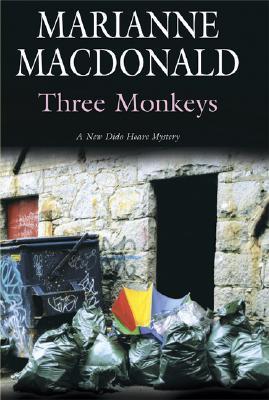
Three Monkeys by Marianne Macdonald
When antiquarian book seller, Dido Hoare’s 4 year old son mentions seeing a monkey as they walk home from school, she at first brushes it off as a school-related fantasy. But it soon appears that reality is hanging around in her backyard garden and pestering her cat.
Then there is the street person who appears to have taken up residence in the cubbyhole alley alongside her rubbish bin. How the two are related becomes the beginning to a fateful tale.
Heavy in human trafficking, domestic violence, prostitution, drug addiction, body parts, and undercover investigations, there is much going on here. Dido makes a couple more acquaintances of interest, maybe a few more enemies and possibly learns a couple valuable lessons that should hold true to the next book.
One of the best things about reading a mystery is finding out if your guesses are right at the big ending reveal. But there was none! Assumptions, yes, but we don’t find out if the cop was dirty, who chopped up and was leaving the body parts, how the old man was involved, if the prostitute is safe, or even if the other bookstore owner was compensated at all for the flower book.
Still, a good read, full of dynamics and a bit of snark. I like Chris Kennedy and continue to adore Barnabas. The addition of Stanley as a more prominent character is also welcome, as is “Charlie” for whom the book is mostly titled.
0 notes
Photo
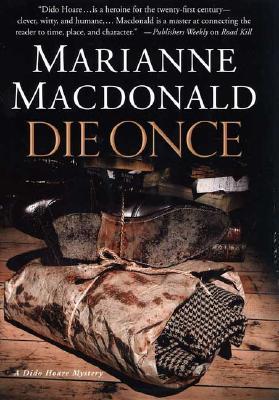
Die Once by Marianne Macdonald
When a longtime customer is found dead after bouncing a check for a book purchased at her antiquarian book store, Dido Hoare sets out to first get her money or book back, then find the killer. But nothing seems to make sense in the circumstances surrounding the death or the desire to find the book.
It’s a twisty tale, full of surprises and new friends. Dido was a bit better about placing herself in harms way on this go, but I agree with her father, Barnabas, that she should ease up on her own risk taking and remember she could leave her toddler son an orphan should she find herself placed in such instances she cannot get out of.
Full of fun British slang and proper phrases, a page-turning car chase and loyalties
0 notes
Photo

Blood Lies by Marianne Macdonald
London based antiquarian book store owner, Dido Hoare, decides she needs a vacation and sets out to stay with an old friend who resides near a family-owned mansion in Somerset.
Upon arrival, she is told that a younger brother to her friend’s husband is about to return from prison. A brother she was unaware existed and was kept mum by the family. His sentence seems wrong to Dido, given it was for the death of a burglar in his own home, so she sets her inquisitive nose to finding the backstory.
This one redeemed the last one, in that there were no stupid risks, especially to her infant child, and I hope it continues as such. A tight read with believable characters and dialogue. Fun British lingo to take note of. Hope to see more of assistant Ernie. Papa Barnabas never fails to entertain and several locals added charm. Not as much of a surprise ending, but still a delight getting to it
0 notes
Photo
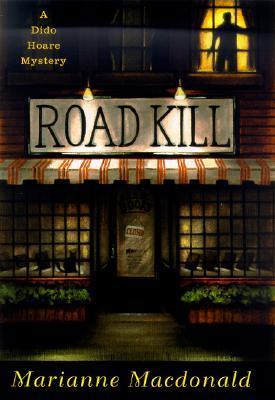
Road Kill by Marianne Macdonald
Antiquarian bookseller, Dido Hoare is rousted from an exhausted sleep by the insensate ringing of her phone. It’s her babysitter calling for help. Can she come? She thinks they have left. Initially, I’m miffed. Who asks a woman to bring an infant child, not the police, to her home after she’s been burglarized & locked in the closet?
It gets dicier. The same burglars return the next day as policemen, supposedly to check for missing property. By way of one’s cologne, the connection is made and reported to the real police, but damage is already done. The babysitter’s husband is found dead. That he was ex-con undercover for the police revealed and probably motive.
I can’t help but get annoyed at how easily and often Dido just up & leaves her infant son alone to run off to investigate something or bundles him up to take somewhere of potential danger. Seriously!
Then, knowing the danger she is about to put herself in, possibly several others, she decides to go about further snooping... against police orders, friends advice and family concern. Idiotic. Sure, I know it will all work out in the end and this is what the book is intended to be: suspenseful & risky, it just annoys me her disregard for her infant child should likely harm befall her. Then when her disregard is abutted with the police, she takes offense at their putting her in jeopardy. After their warnings, her father’s, friend’s.. she takes offense.
The finish is quite climatic and more than I anticipated. Where to go from here after I have developed a dislike for the main character. Still enamored with the rest of the cast, I’ll give this series one more book, if she’s just as negligent, I’ll close the chapter
0 notes